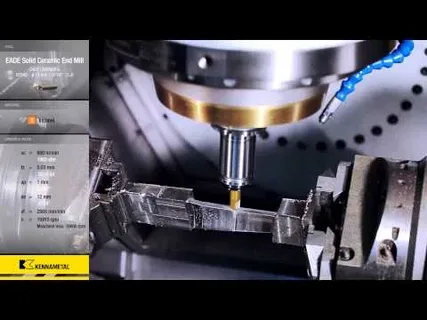-
Fil d’actualités
- EXPLORER
-
Blogs
Advancing Precision Manufacturing with Ceramic CNC Machining

From aerospace turbines to semiconductor components, ceramic materials have become essential in high-performance engineering. Their hardness, temperature resistance, and electrical insulation make them ideal for complex parts—but they’re notoriously difficult to shape. That’s where Ceramic CNC Machining bridges the gap between ceramic’s potential and precision manufacturing requirements. In this article, we explore how CNC machining enables engineers and OEMs to turn ceramic designs into high-quality, production-ready components for demanding applications.
Why Ceramic CNC Machining is a Game-Changer for OEMs
Ceramics aren’t just lab materials anymore—they’re the cornerstone of innovation in industries where performance, reliability, and precision are non-negotiable. Engineers rely on ceramic parts for their exceptional strength-to-weight ratio, corrosion resistance, and ability to withstand thermal and mechanical stress. In applications ranging from implantable medical devices to aerospace jet engine nozzles, ceramics consistently outperform metals in extreme environments.
However, their unique properties also present significant machining challenges. Ceramics are inherently brittle and prone to cracking under traditional manufacturing methods. This is where CNC machining with specialized tools and techniques becomes essential. It enables the precise shaping of hard, fragile materials without compromising structural integrity, offering manufacturers new levels of performance without sacrificing manufacturability.
Engineering Challenges and CNC Solutions for Ceramics
Understanding Ceramic Properties
Unlike metals or polymers, ceramics have a crystalline molecular structure, giving them high hardness and heat resistance but low ductility. This lack of plasticity means ceramics don’t bend before breaking—they fail suddenly. That brittleness calls for advanced strategies in feed rates, tooling, and machine control to achieve reliable results during machining.
Commonly used technical ceramics include alumina (Al₂O₃), zirconia (ZrO₂), silicon nitride (Si₃N₄), and silicon carbide (SiC). Each material offers distinct advantages but also unique machining behaviors. Alumina is cost-effective and wear-resistant, while zirconia is tougher and more suitable for high-impact applications. Silicon carbide, on the other hand, excels in thermal conductivity and extreme environments.
Specialized Tools and CNC Programming
Ceramic CNC machining requires diamond-coated or polycrystalline diamond (PCD) tools capable of enduring constant contact with ultra-hard surfaces. These tools must operate at optimal spindle speeds and low feed rates to reduce tool wear and material stress. Vibration control is crucial—any instability can lead to catastrophic part failure.
Moreover, 5-axis CNC machines offer the flexibility and precision needed to create intricate geometries while minimizing tool changes and repositioning. Programming must account for ceramic-specific behavior, such as thermal sensitivity and fracture propagation, using advanced simulation software before any physical toolpath is executed.
Quality Assurance and Dimensional Accuracy
In high-performance applications, there is no room for error. Ceramic parts are often deployed in conditions where reliability is critical, such as in biomedical implants or engine components. Therefore, manufacturers must meet tight dimensional tolerances, often in the micron range. At MYT Machining, ceramic CNC processes are supported by real-time quality monitoring systems, coordinate measuring machines (CMM), and rigorous inspection protocols to ensure every part meets customer expectations.
Surface finish is another crucial factor. Depending on the application, the finish may range from matte for friction control to ultra-smooth for biomedical compatibility. Post-machining processes such as ultrasonic cleaning and laser inspection are often used to refine surfaces without inducing defects.
Real-World Applications of Ceramic CNC Machining
Ceramic CNC machining unlocks design possibilities in several advanced manufacturing sectors:
-
Medical Devices: Biocompatible ceramics like zirconia are used in dental implants, surgical tools, and prosthetics due to their corrosion resistance and non-reactivity.
-
Aerospace: Engine components, heat shields, and sensor housings benefit from ceramics' heat tolerance and mechanical strength.
-
Semiconductor and Electronics: High-voltage insulators, circuit substrates, and thermal spreaders use ceramics for electrical insulation and thermal management.
-
Automotive: Oxygen sensors, injector nozzles, and brake components benefit from wear resistance and chemical stability of ceramics.
-
Energy Sector: Fuel cells, nuclear reactor insulators, and turbine components operate in high-temperature, corrosive environments that ceramic materials can withstand.
For engineers and product designers, CNC-machined ceramics allow for innovative geometries and high-precision tolerances that would be otherwise impossible with molding or casting methods alone.
Choosing the Right CNC Machining Partner for Ceramics
When it comes to ceramic machining, not all suppliers are equal. General-purpose CNC shops may struggle with the complexities of ceramic materials, leading to high scrap rates, low part quality, or extended lead times. Engineers and procurement teams should prioritize partners who have:
-
Deep material knowledge and ceramic machining expertise
-
Specialized tooling and advanced CNC equipment
-
In-house design support and DFM (Design for Manufacturability) guidance
-
Rigorous quality control systems and metrology equipment
-
Scalable capabilities for both prototype and production runs
Why Engineers Trust MYT Machining
MYT Machining offers specialized ceramic CNC machining services tailored to high-performance industries. Our engineers work directly with clients to optimize part geometry, reduce stress concentrations, and avoid costly material failures. Whether you're developing a prototype or launching full-scale production, our processes are designed to maximize material performance and manufacturability.
We understand the unique requirements of ceramic components—from feed-rate calibration to fixture stability—and offer turnkey solutions that deliver both accuracy and consistency. Our experience spans sectors including medical, aerospace, energy, and semiconductors, making us a trusted partner for engineers, OEMs, and startups building tomorrow’s critical components.
Final Thoughts: Precision Meets Possibility
Ceramic CNC machining enables engineers to push the boundaries of performance, durability, and design. When processed correctly, ceramics outperform traditional materials in some of the world’s most demanding applications. But success starts with a capable partner—one who understands the nuances of ceramic behavior, uses the right equipment, and follows a proven quality-driven process.
At MYT Machining, we provide more than just machining—we deliver confidence, precision, and competitive value in every ceramic component. If you’re looking to innovate with advanced materials and dependable results, our ceramic CNC expertise is ready to help you succeed.





